North Tyneside Covid walk-in test sites to move to areas of 'higher need'
- Published

The PCR testing sites for people without symptoms have been in place since 22 May
Walk-in Covid-19 testing sites set up on North Tyneside in response to a rise in cases are to be removed and sent to areas of the country in greater need.
The mobile units, for those without symptoms, have been at North Shields, Wallsend and Shiremoor, since 22 May.
The council said more than 4,000 tests were carried out at the sites and in targeted door-to-door testing, with one in every 100 tests being positive.
It urged those who had not yet had tests to visit before the weekend.
The total confirmed cases of the Delta, or so-called Indian, variant in the borough stands at 79 and the current infection rate is 74 per 100,000 people, far lower than many areas in the north west of England.
Testing sites will remain at other locations for people with symptoms.
'Delay ending roadmap'
The council said it was a joint decision with the government to withdraw surge testing.
People are still being asked to minimise travel in and out of the borough, although this is not enforceable by law.
Wendy Burke, North Tyneside's public health director, encouraged people to make use of the mobile sites before they were moved to "higher need" areas.
"Every test taken, positive case found, and vaccine given, helps to reduce the chances of onward transmission and keep North Tyneside safe," she said.
"However, we are not out of the woods yet and we continue to monitor the situation closely and will take appropriate measures if and as required."

Mobile testing units in parts of North Shields will be packed away on Sunday
Meanwhile in Gateshead, the council's public health director Alice Wiseman said the final stage of Boris Johnson's roadmap - which is due to see an end to restrictions on 21 June - should be delayed if cases keep rising.
The most frequent age of those being infected in the area was 14 years, with people aged in their mid-20s making up the average age, the Local Democracy Reporting Service said.
Ms Wiseman said: "Around 70% of positive cases are aged 30 or younger, so if cases continue rising at this rate, I would support delaying step four of the roadmap for a few weeks to give the vaccination programme time to reach younger groups.
"A delay would also allow us to monitor the impact of this worrying increase in cases and make it more likely that when the remaining restrictions are lifted, they're lifted for good."
It has also been revealed that in Sunderland more than half of the city's adult population has received both jabs. Health bosses said vaccine teams were on the "home run" but there was still a way to go.

Follow BBC North East & Cumbria on Twitter, external, Facebook, external and Instagram, external. Send your story ideas to northeastandcumbria@bbc.co.uk, external.
- Published23 May 2021

- Published22 May 2021
